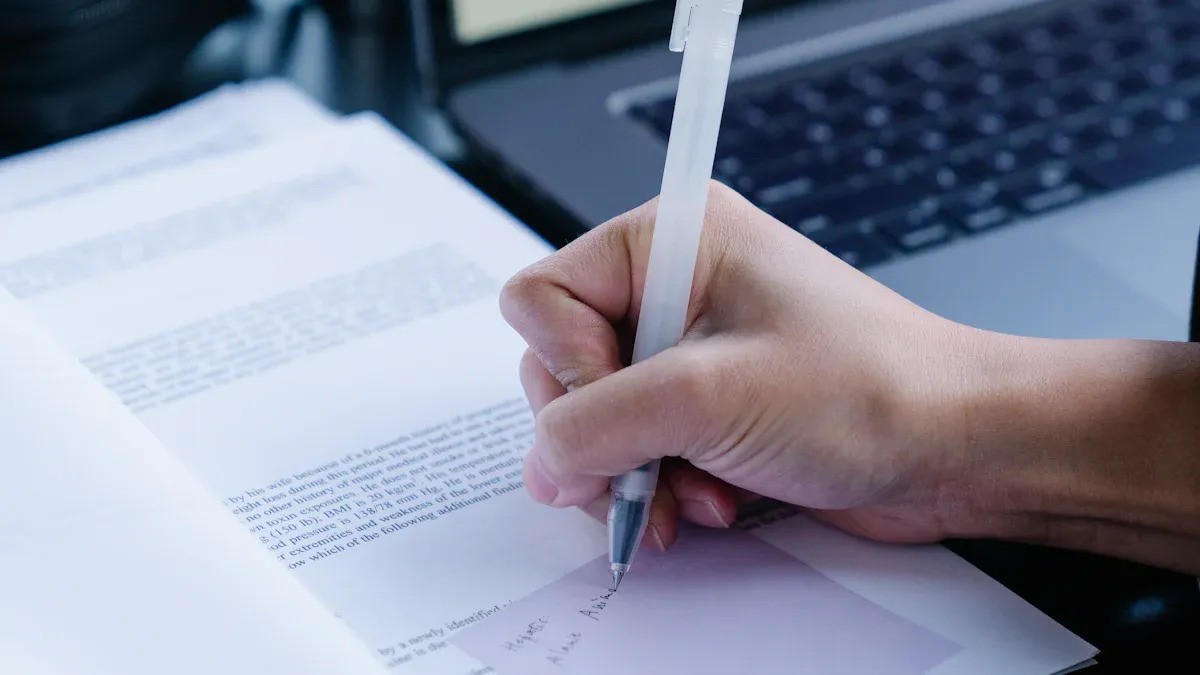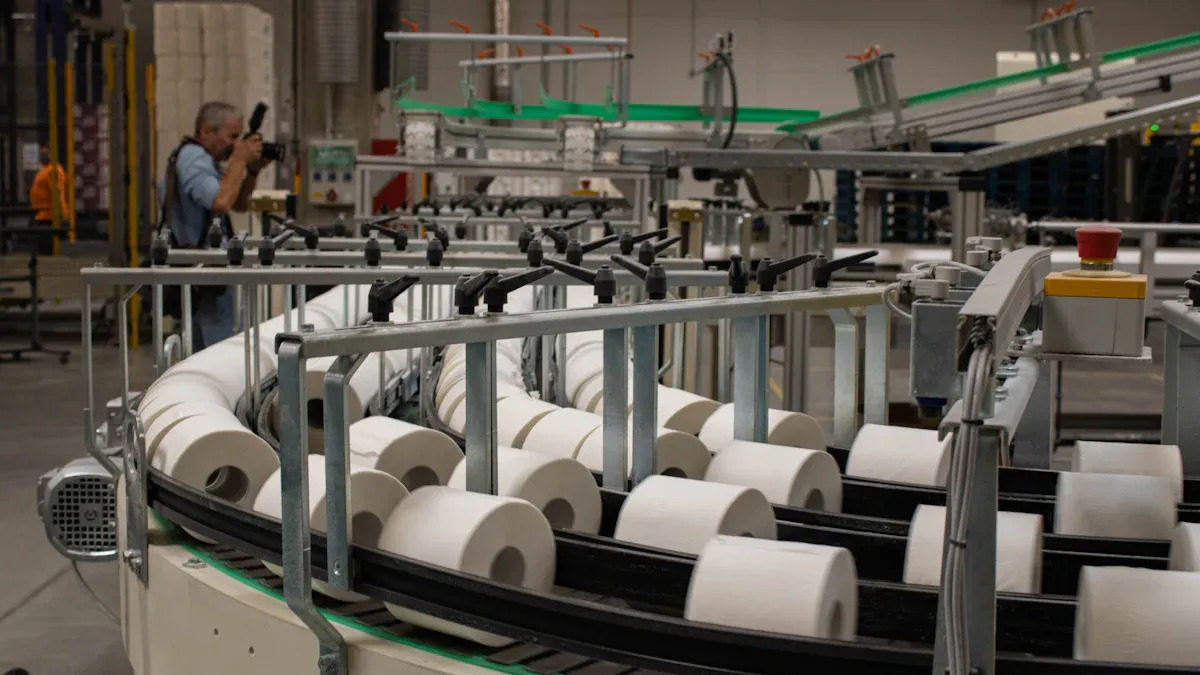
Scritta paper gives you a smooth, strong surface for writing and printing. You notice its brightness and clean finish right away. This paper stands out because it resists ink bleed and holds color well. When you use scritta paper, you get pages that feel crisp and look sharp. Many people choose this paper for important documents, creative projects, and packaging needs.
Scritta paper offers a reliable choice when you want your paper to last and look professional.
Key Takeaways
Scritta paper has a smooth and bright surface. It stops ink from bleeding. This makes it great for work papers and art projects.
This paper is strong and lasts a long time. You can use it for printing and packaging. It keeps your things looking nice and safe.
Scritta paper uses high-quality cellulose fibers. These fibers stop the paper from turning yellow. They also help the paper stay strong for years.
It works well for office jobs, art, and hygiene products. Scritta paper gives good results for many different uses.
More companies now use recycled materials in paper. They also follow eco-friendly ways to make paper. Sustainability is becoming more popular in paper making.
Scritta Paper Properties
Physical Traits
When you touch scritta paper, you notice its traits right away. It feels thin and light, but it does not rip easily. Each sheet has the same thickness, so you get steady quality. The surface is smooth, which helps you write or print with ease. You can print on both sides because the paper is not see-through.
Here is a table that shows how scritta paper’s surface finish compares to other papers:
| Characteristic | Scritta Paper | Other Papers |
| Opacity | High | Varies |
| Smoothness | High | Varies |
| Brightness | High | Varies |
| Yellowing | Does not yellow | May yellow due to lignin |
| Manufacturing Ease | Difficult to manufacture | Generally easier to produce |
| Printing Equipment | Requires specialized presses | Standard printing equipment |
Scritta paper is smoother, brighter, and does not turn yellow. These features make it great for special documents and creative work.
Chemical Makeup
Scritta paper is made from good cellulose fibers. The pulp and how it is made matter a lot. Makers use woodfree pulp and sometimes add linen or cotton fibers. This mix makes the paper strong but still thin and light. The paper does not have lignin, so it does not turn yellow. You get clean, off-white bible paper that works for many uses.
Performance
Scritta paper works well in many ways. Ink does not bleed, so your writing looks neat. The paper is thick enough for printing on both sides, which saves space. Colors look bright and clear on this paper. You get the same good results every time you use it. You can use scritta paper for office work, packaging, or art without worrying about smears or fading.
Tip: Pick scritta paper if you want your printing or writing to look great. Its features help you get a professional look.
Durability
Scritta paper may feel thin, but it is strong. Linen or cotton fibers make it tougher. You can fold and use it without it breaking. Even though it feels soft, it lasts through daily use. Off-white bible paper does not turn yellow and keeps its quality. The way it is made helps it stay strong, even if it gets wet or used a lot. You get a tough paper that works for many things.
Scritta Paper Uses

Image Source: pexels
Office
You often use scritta paper in offices for daily tasks. This paper works well for reports, memos, and meeting notes. You can print or write on it without worrying about ink smears. The smooth surface helps your pen or printer glide easily. You get clear, sharp text every time. Many offices choose this paper because it looks professional and lasts a long time.
Printing
Scritta paper stands out in the printing world. You see it used for the printing of bibles and other religious texts. The paper’s thinness lets you fit many pages into one book, but it still stays strong. You also find it in the printing of novels, manuals, and catalogs. Here is a table that shows why this paper is a top choice for high-quality printing:
| Advantage | Description |
| High-Quality Material | Made from 100% virgin pulp, giving a premium feel and look. |
| Customization Options | Available in many gsm weights and sizes for your needs. |
| Environmentally Friendly | Woodfree paper helps lower environmental impact. |
| Versatile Printing Compatibility | Works well with offset printing, perfect for bibles and other important books. |
| Free Sample Availability | You can ask for a sample to check the quality before you buy. |
You get bright colors and sharp images. The paper does not let ink bleed, so both sides look clean. Many printers use it for the printing of religious texts and other special projects.
Packaging
You find scritta paper in packaging for luxury goods and gifts. The paper feels smooth and looks bright, making products stand out. You can fold and shape it without tearing. Many brands use this paper for wrapping, inserts, and labels. The strength of the paper keeps items safe during shipping.
Hygiene
Scritta paper also appears in hygiene products. You see it in tissues, napkins, and medical sheets. The paper feels soft but stays strong when wet. You can trust it for personal care and cleaning. Many hospitals and clinics use this paper because it does not irritate the skin.
Artistic
Artists love scritta paper for drawing, sketching, and crafts. The smooth surface lets you use pencils, pens, or paints. You get bright, true colors on every sheet. The paper does not tear or wrinkle easily. Many art teachers and students pick this paper for projects and portfolios.
Note: The common uses of bible paper include printing, packaging, hygiene, and art. You can rely on scritta paper for many needs because it adapts to different tasks.
Scritta Paper Manufacturing

Raw Materials
You start with the right raw materials to make high-quality paper. Most scritta paper uses a mix of different fibers. Here are the main sources:
Wood pulp: Comes from wood chips or logs. This pulp gives the paper strength and durability because softwood fibers are long.
Cotton: Adds softness and makes the paper last longer. You find cotton in fine printing paper and other specialty products.
Hemp: Offers high tensile strength. You often see hemp blended with wood pulp for extra durability.
Flax: Used in some fine art and banknote papers for its unique texture.
Cellulose fiber: Forms the main structure of the paper, giving it stability.
The choice of raw materials affects how the paper feels, how strong it is, and how well it prints. If you want a smooth, bright sheet, you need high-quality fibers.
Pulping
You need to turn raw fibers into pulp before you can make paper. The pulping process breaks down the fibers and removes unwanted parts like lignin. Two main methods exist:
Kraft pulping: Uses chemicals to remove lignin. This method creates strong, bright pulp, perfect for fine printing paper.
Sulfite pulping: Also removes lignin but uses different chemicals. This process makes a softer pulp, which works well for specialty papers.
You can also use recycled pulp, but it may not be as bright or durable as virgin pulp. The table below shows how different pulps affect the environment and the final product:
| Type of Pulp | Environmental Impact | Durability Impact |
| Virgin Pulp | Bright and strong, ideal for high-quality packaging | High |
| Recycled Pulp | More eco-friendly but less white and durable | Lower durability |
| Additives (Sizing, Fillers, Coatings) | Enhance performance but may affect recyclability | Varies based on type |
You choose the pulping method based on the type of paper you want to make.
Refining
After pulping, you refine the pulp to improve the fiber quality. You use machines to beat and separate the fibers. This step helps the fibers bond better when you form the sheet. If you want a smooth, strong paper, you need to refine the pulp just right. Too much refining makes the paper weak. Too little makes it rough and hard to print on.
You can add fillers and sizing agents during refining. These materials help control how much ink the paper absorbs and how smooth it feels.
Sheet Formation
You move the refined pulp to the paper machine. Here, you spread the pulp onto a moving screen. Water drains away, and the fibers start to stick together. This step forms a thin, even sheet.
You control the thickness and weight of the paper by adjusting the speed and amount of pulp. For scritta paper, you want a thin but strong sheet. The paper machine plays a big role in making sure every sheet looks and feels the same.
Drying
You need to dry the wet sheet before you can use it. The paper passes through heated rollers that remove most of the water. This step makes the paper flat and smooth.
If you dry the paper too quickly, it can warp or crack. If you dry it too slowly, it may not be strong enough. You must balance speed and heat to get the best results.
Finishing
You finish the paper by smoothing and cutting it. You can use calendering machines to press the paper and give it a glossy or matte finish. You may also coat the paper to make it brighter or more resistant to ink.
You cut the paper into sheets or rolls, depending on how you plan to use it. Fine printing paper often gets extra finishing steps to make sure it looks perfect.
Tip: The finishing process can add special features like watermarks or security threads for important documents.
Quality Control
You check every batch of paper to make sure it meets your standards. You test for thickness, brightness, strength, and smoothness. If the paper does not pass these tests, you adjust the manufacturing processes and try again.
You also check for defects like spots, tears, or uneven color. Quality control helps you deliver reliable paper for printing, packaging, and art.
Note: Careful quality control ensures that scritta paper always meets the needs of fine printing paper and other demanding uses.
Trends
Sustainability
Many companies now try to make paper better for the earth. They use recycled fibers to help save trees. Factories use less water when making paper. Some factories use energy from the sun or wind. You can buy paper from forests that get replanted. This means new trees grow after old ones are cut. Many brands now sell packaging that breaks down in nature. When you pick these papers, you help protect the planet.
Tip: Check for FSC or PEFC labels on paper. These labels mean the paper comes from good sources.
Technology
New technology is changing how paper is made and used. Machines now have sensors to check if paper is thick or smooth. This helps make sure the paper is always good quality. Some printers use less ink and work faster. You can find packaging with QR codes printed on it. Digital printing lets you make special designs for small orders. Some paper has coatings that keep out water or stop germs.
Here is a table that shows how technology helps paper:
| Innovation | Benefit |
| Automated Sensors | Same quality every time |
| Digital Printing | Special designs |
| Smart Packaging | More information |
| Special Coatings | Extra safety |
Market
The paper market is changing fast. More people want paper that is good for the earth. Offices use less paper because of computers, but more paper is used for packaging. Many brands use paper for fancy boxes and cool designs. Tissues and medical sheets are still needed. You can now find paper in things like food wraps and art supplies. The market gives you more choices each year.
Note: You help decide what paper is made by what you buy and need.
Scritta paper has a smooth and strong surface. You can write or print on it easily. It looks bright and lasts a long time. People use it for office work and art projects. Careful steps make scritta paper reliable.
You can pick scritta paper for important papers.
It works well for packaging and hygiene products.
New trends use earth-friendly materials and smart machines.
Scritta paper lets you get great results and uses new ideas.
FAQ
What makes Scritta paper different from regular paper?
You get a smoother, brighter surface with Scritta paper. It resists ink bleed and does not turn yellow. You can use both sides without see-through. This paper feels thin but stays strong for many uses.
Can you recycle Scritta paper?
Yes, you can recycle Scritta paper. Most recycling centers accept it. Make sure the paper is clean and dry before you recycle it. You help the planet when you recycle your used paper.
Is Scritta paper safe for skin contact?
You can safely use Scritta paper for hygiene products. The paper does not have harsh chemicals. Hospitals and clinics trust it for tissues and medical sheets. It feels soft and does not irritate your skin.
What types of printers work best with Scritta paper?
You get the best results with offset and digital printers. The smooth surface helps ink stick well. You can also use laser and inkjet printers for home or office tasks.
How do you store Scritta paper to keep it in good shape?
Store Scritta paper in a cool, dry place. Keep it away from sunlight and moisture. Use a closed box or wrapper to protect it from dust. This helps your paper stay bright and strong.



























